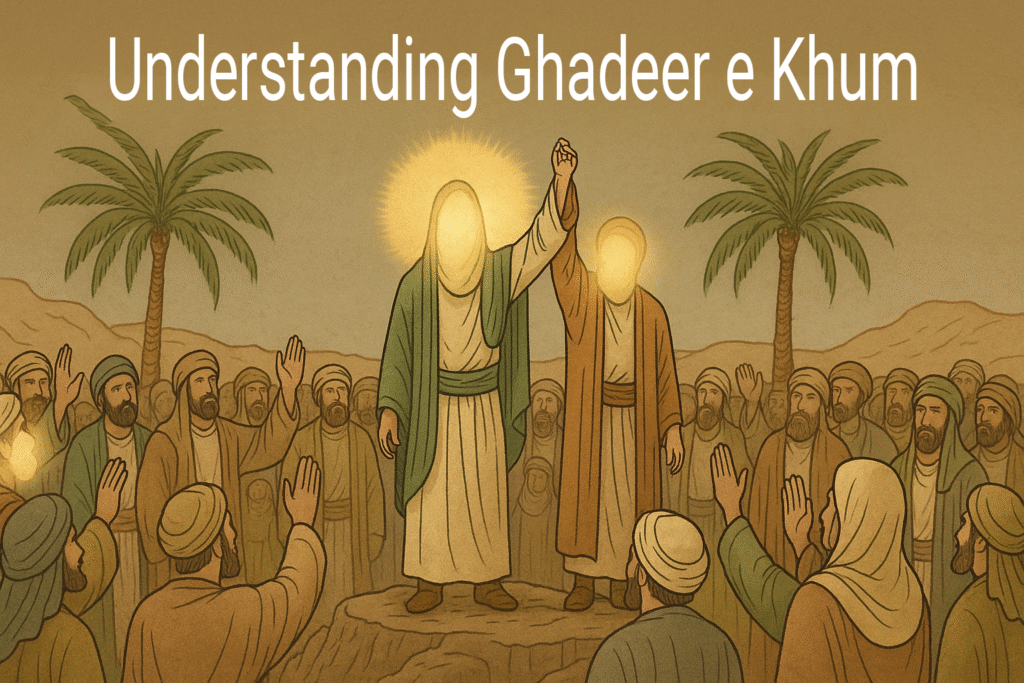Table of Contents
- Introduction
- What Happened at Ghadeer Khumm?
- The Verse of Proclamation (Quran 5:67)
- The Declaration: “Man Kuntu Mawla…”
- Witnesses of Ghadeer and Their Testimonies
- Imam Ali’s Reaction and Historical Significance
- Wilayah vs. Friendship: What Does “Mawla” Mean?
- Sunni and Shia Perspectives on Ghadeer
- Ghadeer in Islamic Literature and Duas
- Conclusion: Ghadeer Khumm as Eternal Proof
Introduction
Among the most decisive and spiritually significant moments in Islamic history is the event of Ghadeer Khumm. Occurring just months before the passing of Prophet Muhammad (PBUH), it was the scene of a formal and public declaration of Imam Ali’s (a.s) divine leadership. The echoes of this moment still resound in the hearts of believers and are commemorated every year on Eid al-Ghadeer.
What Happened at Ghadeer Khumm?
After performing the Farewell Hajj, the Prophet (PBUH) stopped at Ghadeer Khumm, a place between Mecca and Medina, on the 18th of Dhul Hijjah. There, he delivered a sermon in the scorching heat to tens of thousands of Muslims.
He asked:
“Am I not more worthy of the believers than themselves?” When the crowd affirmed, he declared: “Man kuntu Mawla, fa haza Aliyyun Mawla.” “Whoever I am his Mawla, then Ali is his Mawla.”
The Verse of Proclamation (Quran 5:67)
“O Messenger, proclaim what has been revealed to you from your Lord. If you do not, then you have not conveyed His message. And Allah will protect you from the people…”
This verse (Surah Al-Ma’idah 5:67) is widely interpreted by Shia scholars to be linked directly to the declaration at Ghadeer. It shows the divine urgency of announcing Imam Ali’s leadership.
The Declaration: “Man Kuntu Mawla…”
The Arabic word “Mawla” carries multiple meanings including guardian, master, and leader. The Prophet’s use of the term was not casual but deliberate. It elevated Imam Ali (a.s) from cousin and son-in-law to divinely appointed successor.
Hadith Reference:
- Reported in Musnad Ahmad ibn Hanbal, Al-Nasa’i, and others
Witnesses of Ghadeer and Their Testimonies
Historical accounts state that over 100,000 companions were present. After the sermon, many companions including Umar ibn al-Khattab said:
“Congratulations, O son of Abu Talib! You have become the Mawla of every believing man and woman.”
Imam Ali’s Reaction and Historical Significance
Imam Ali (a.s) never aggressively asserted his right, but he often referenced Ghadeer when challenged.
Example: In the event of Shura (council), he reminded them:
“Did not the Prophet say: Whomsoever I am his Mawla, Ali is his Mawla?”
His calm yet firm stance remains a lesson in patience, principle, and unwavering faith.
Wilayah vs. Friendship: What Does “Mawla” Mean?
Some argue “Mawla” means friend. But the context, setting, Quranic backing, and subsequent congratulations show it implied spiritual and political authority, not just camaraderie.
The event was too grand for a mere reminder of friendship—it was a declaration of Wilayah.
Sunni and Shia Perspectives on Ghadeer
- Shia View: A clear appointment of Imam Ali (a.s) as the Prophet’s successor.
- Sunni View: While acknowledging the event, many interpret it as a sign of respect and virtue, not succession.
However, many Sunni scholars have authenticated the Hadith and accept its historicity.
Ghadeer in Islamic Literature and Duas
- Ziyarat of Imam Ali (a.s) often refers to Ghadeer
- Dua-e-Nudba and Eid al-Ghadeer sermons highlight the day as proof of rightful succession
Dua Example:
“O Allah, I testify that Ali was appointed by Your Messenger at Ghadeer…”
Conclusion: Ghadeer Khumm as Eternal Proof
The event of Ghadeer Khumm is not a political claim—it is a spiritual truth embedded in the prophetic mission. It is the day when leadership was handed over to the one who was raised in the Prophet’s home, who slept in his bed on the night of Hijrah, and who stood by him in every battle.
Believers remember this day not only as a historic milestone but as a divine declaration of Wilayah—a light that continues to guide.

